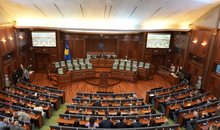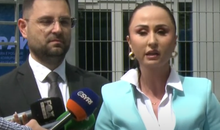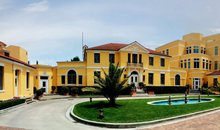
 Flash News
Flash News
The body of a 29-year-old man in Klos is found after 6 days
Arrested a few meters from SPAK, the Special Prosecution seeks 17 years in prison for the drug 'boss'
Giro D'Italia starts today, here are the road axes that will be blocked in Tirana from 13:00-18:00
Who is the new Pope?
Pope Leo XIV greets the faithful for the first time in St. Peter's Square
Does Albania have a 'British problem' or Britain an 'Albanian problem'?

Alfred Lela
There is a tendency, led by Prime Minister Rama, and accompanied by the attitude of the media and intellectual circles, to say that it is Great Britain that has a problem in the case of the Albanian influx to cross the Channel.
Others preach that it is Albania's problem, which is related to depopulation, economic and social problems, which in turn become demographic drama, and so on.
Even if we choose to look at the problem from the upside-down perspective, despite what our gut feeling says, and accept that it is in fact a 'British problem' and not an Albanian one, it is the conclusions that refute us, or not, despite our desires.
Then, in this line of logic, let's say that yes, it is the broken British migration system that is to blame for what some call a crisis, and others just a picture from the chronicle on the shores of England.
By excusing the Albanian element, both the people who flee and the government that does not create conditions for them, we seem to make the premise of a new question: if it has failed, is it possible for the British system to recover and correct the flaw, from which the very system suffers, currently or temporarily?
All data and probabilities prove that, in fact, Great Britain has the economic opportunity, the knowledge, the legislative experience, and the will to solve the 'Albanian problem', undoing it, at the same time, as a 'British problem'.
The opposite is the case in Albania. Suppose the problem is Albanian, as some insist. In that case, Albania has a much more complex solution to produce, because it cannot close its borders, nor can it properly scan its citizens and their reasons for traveling. The solution that the Albanian government can produce it can not be fast, but medium and long term; it requires anti-migratory policies, which are mainly related to job creation, salary increases, the creation of a suitable social and cultural environment, etc. So, all these conditions, which apparently Albania lacks, Britain fulfills.
This simple logical exercise assures us that the problem, then, is Albanian and not British, and is not solved with aggressive nationalist rhetoric, but with humility, acknowledging that, first of all, we have a problem. Edi Rama does not like to do this, but by using the connections with exponents of the British left, he is using the opportunity to attack the conservative government and the politics of the right.
Not far from this attitude was his siding with George Soros, labeling the Republican presidential candidate, Donald Trump, as a "disgrace to civilization".
Knowing this, the problem becomes dually Albanian: not only do we not have the infrastructure to react immediately to a crisis, but we also do not have a government of goodwill that identifies the problem, accepts it, and sets out on the path to a solution.
Quite the opposite: our government ventures to solve a domestic problem with international megalomaniacal North Korean-style.
So wrong.
Latest news





Rama's fourth act: between Brussels and the Mafia
2025-05-09 12:12:47
The body of a 29-year-old man in Klos is found after 6 days
2025-05-09 12:01:27
Berisha: After May 12, this opposition will become the majority in Albania
2025-05-09 11:52:37
Leo XIV celebrates his first Mass as Pope
2025-05-09 11:42:34

Spaho denounces: SP candidate in Pogradec gives 100 thousand lek for the vote
2025-05-09 11:27:26
Mustafaj: Proud of the worthy campaign of the DP
2025-05-09 11:22:20
Constitution fails again, Kosovo still without a new Assembly
2025-05-09 11:06:55





"Votes have no price", the US embassy in Tirana 'slaps' Rama
2025-05-09 10:06:49

Two young men arrested for supplying criminal groups with firearms
2025-05-09 09:45:19







Foreign exchange/ How much foreign currencies are bought and sold today
2025-05-09 08:19:18
The gift that Berisha gave to Rama 'live'
2025-05-09 08:13:51
3 signs that show you are spiritually protected
2025-05-09 08:05:39

Bars can't hold back anymore, start increasing coffee prices, 4.7% more in April
2025-05-09 07:46:49

Horoscope, what do the stars have in store for you today?
2025-05-09 07:22:06
Unstable weather, afternoon brings rain
2025-05-09 07:01:29
Morning Post/ In 2 lines: What mattered yesterday in Albania
2025-05-09 06:45:46

How did LaCivita change the DP campaign? Berisha: He studied the opponent
2025-05-08 22:49:51

David defeats Goliath
2025-05-08 22:15:50

Journalist: There are SPAK infiltrators in party headquarters
2025-05-08 21:55:15
Who is the new Pope?
2025-05-08 21:48:13
Berisha finally reveals when he will retire from politics
2025-05-08 21:33:46


LaCivita in Lezha: Albanians will fire Edi Rama from his job
2025-05-08 21:11:20


Berisha: LaCivita chose us because he believes in Reagan's program
2025-05-08 20:48:40
He rejected America to serve Pogradec, Genti Çela tells about life in "Elevate"
2025-05-08 20:26:28




Pope Leo XIV greets the faithful for the first time in St. Peter's Square
2025-05-08 19:29:33




Photo session with LaCivitta in Tirana: For Great Albania
2025-05-08 18:40:18
Source: DASH decision a personal victory for Berisha
2025-05-08 18:30:10
Take off those crazy glasses and see where you've taken him?
2025-05-08 18:02:47
LDK files criminal charges against members of the incumbent Government
2025-05-08 18:02:00







BIRN analysis: Tirana, the determining district for the future majority
2025-05-08 16:04:03




Chris LaCivita's contract with the DP, Berisha: 100% correct and clean
2025-05-08 15:11:11

"These are the peak days", Berisha reveals when he will travel to the USA
2025-05-08 14:45:25


Endless boxes with filled-in ballots, DP demands separation of votes from Greece
2025-05-08 14:11:12


Photo/ Who are the 3 associates of Talo Çela arrested in Dubai?
2025-05-08 13:37:09

Hetimi për krimet zgjedhore, Altin Dumani zbarkon në Prokurorinë e Shkodrës
2025-05-08 13:06:21
DASH paves the way for Berisha, Alizoti: Great news on the eve of Great Albania!
2025-05-08 13:03:48

"Freedom works", DP welcomes the US position
2025-05-08 12:48:07

Black smoke rises from the Sistine Chapel, the Vatican still without a Pope
2025-05-08 12:26:18





Davide Pecorrelli extradited to Albania
2025-05-08 11:29:04
'May 11, Albania will react', Xhaferri: Electoral criminals will pay
2025-05-08 11:21:46
